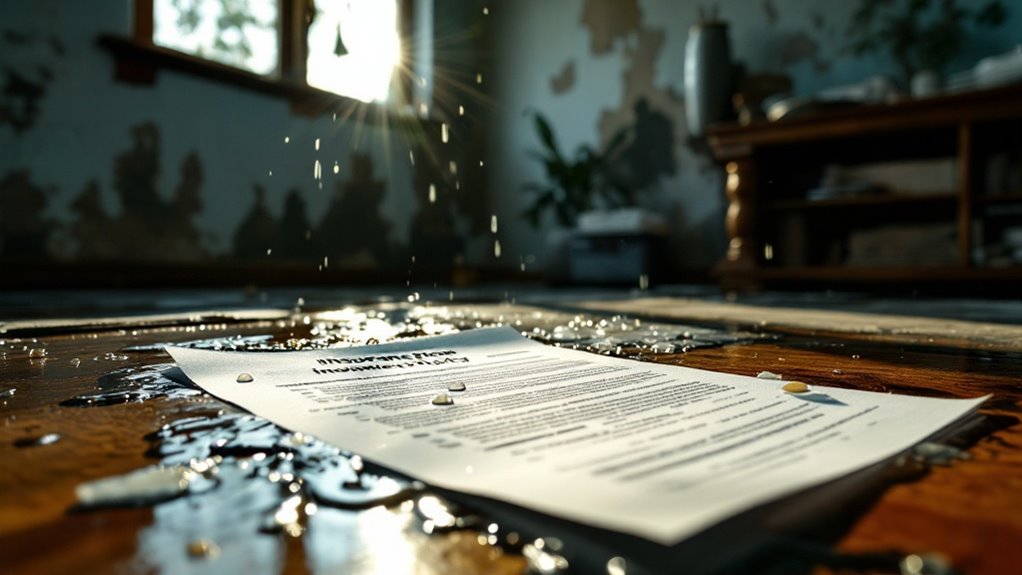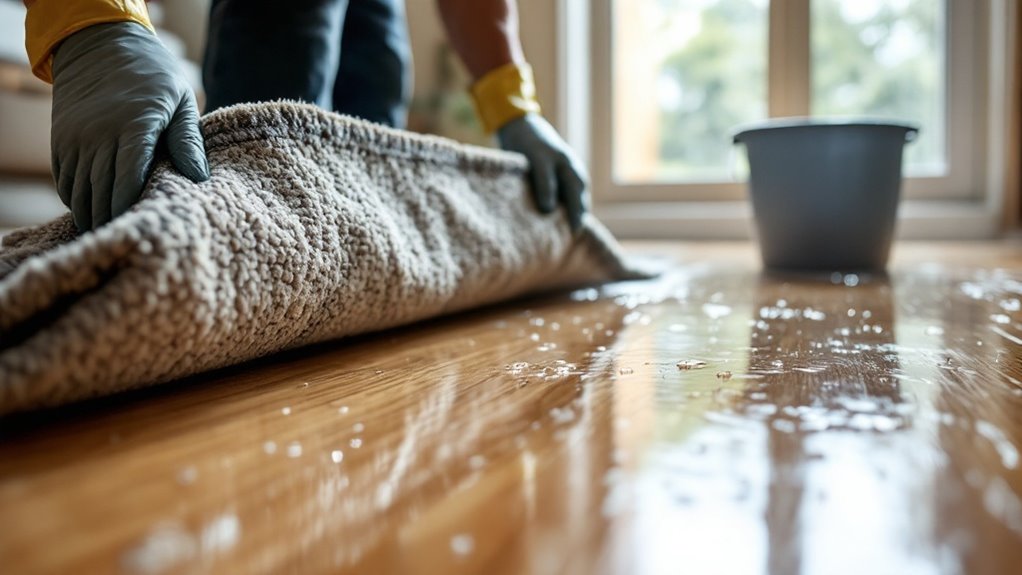When it comes to filing a water damage insurance claim, you need to know a few key factors before you start. Understanding your policy coverage is crucial, as not all types of water damage may be included. You should likewise document the damage thoroughly and take immediate action to prevent further issues. But there’s more to take into account, and overlooking any detail could affect your claim greatly. What should you do next?
Key Takeaways
- Review your insurance policy to understand coverage limits, deductibles, and specific exclusions related to water damage.
- Document all damage thoroughly with photos, videos, and a detailed list of affected items for your claim.
- Mitigate further damage by turning off water sources and removing standing water to prevent complications during the claims process.
- Report the incident to your insurance company promptly and keep records of all communications regarding your claim.
- Be aware of claim deadlines and requirements to ensure you receive the compensation to which you are entitled.
Understand Your Insurance Policy Coverage

How well do you understand your insurance policy coverage when it comes to water damage? It’s essential to know what your policy includes, as not all water damage is treated the same. For instance, sudden leaks or burst pipes might be covered, while flooding from heavy rains could require separate flood insurance. Look for terms like “dwelling coverage” and “personal property coverage” to see what’s protected. Don’t forget about deductibles—these can affect how much you’ll receive after filing a claim. Review your policy details and ask your agent for clarification on any confusing terms. Understanding your coverage now can save you stress and surprises later when you face a water damage situation. Additionally, being aware of policy exclusions can help you avoid unexpected surprises during the claims process.
Document the Damage Thoroughly
Once you understand your insurance policy coverage, the next step is to document the damage thoroughly. Start by taking clear photos or videos of the affected areas. Make sure to capture the damage from various angles. Keep a detailed list of damaged items, noting their condition and estimated replacement costs. This documentation will be essential for your claim. Additionally, consider reaching out to professionals for water damage restoration services, as they can assist in ensuring your claim is processed smoothly.
Here’s a quick reference table for effective documentation:
| Item Description | Damage Observed |
|---|---|
| Living Room Couch | Water stains, mold |
| Kitchen Cabinets | Warped, peeling paint |
| Bedroom Carpet | Soaked, musty smell |
| Electronics (TV) | Short-circuited |
Take Immediate Action to Mitigate Further Damage

Taking immediate action to mitigate further damage is crucial after uncovering water damage in your home. Start by turning off the water source if it’s still leaking; this prevents more water from entering your space. Next, unplug any electrical appliances in the affected area to avoid potential hazards. Use towels or a wet/dry vacuum to remove standing water, as this helps minimize damage to your floors and walls. Open windows and doors to promote airflow, which aids in drying out damp areas. If the damage is extensive, consider contacting a professional water damage restoration service. Acting quickly not only protects your property but additionally strengthens your case when you file your insurance claim. Additionally, enlisting the help of expert water damage restoration services can ensure thorough restoration and minimize long-term impacts.
Gather Necessary Evidence and Information
As you prepare to file your water damage insurance claim, gathering necessary evidence and information is essential for a successful process. Collecting the right documentation helps support your claim and can ease your worries during this stressful time. Here’s what you should focus on:
- Photographs of the damage, capturing different angles and details.
- Videos that show the extent of the water intrusion.
- Receipts for any repairs or emergency services you’ve already incurred.
- Written statements from witnesses, if applicable, about the incident.
- Insurance policy details outlining your coverage limits and exclusions.
Contact Your Insurance Company Promptly

After experiencing water damage, it’s essential to report the incident to your insurance company right away. This prompt action not only helps you understand your policy coverage but additionally speeds up the claims process. Don’t wait too long, as delays could affect your compensation.
Report Incident Immediately
When water damage strikes, contacting your insurance company promptly is crucial. Delaying this step can complicate your claim and lead to unnecessary stress. You’ll want to make sure your voice is heard and your situation is understood. Here’s what to remember when reporting:
- Emotional strain: The stress of water damage can be overwhelming.
- Urgency: Quick action can prevent further damage and costs.
- Documentation: Your prompt report helps establish a clear timeline.
- Support: Your insurer can guide you through the claims process.
- Peace of mind: Knowing you’ve taken the first step can ease your worries.
Understand Policy Coverage
Once you’ve reported the incident, it’s important to understand your policy coverage. Take time to review your insurance policy to see what types of water damage are covered. Not all policies are the same; some may cover sudden leaks while excluding damage from flooding or long-term wear. Contact your insurance company promptly to ask questions and clarify any uncertainties. They can explain the specifics of your coverage, including deductibles and limits. Knowing what’s covered will help you navigate the claims process more effectively. Additionally, keep a record of your conversations and any documents they provide. This proactive approach guarantees you’re prepared as you move forward with your claim. Understanding your coverage can lead to a smoother, less stressful experience.
Be Aware of Claim Deadlines and Requirements
Understanding the claim deadlines and requirements is crucial, as missing them can jeopardize your chances of receiving compensation for water damage. You need to keep track of several key factors:
- Notification Timeframe: Inform your insurer promptly—delays can hurt your claim.
- Documentation: Gather evidence, like photos and receipts, to support your case.
- Claim Forms: Fill out all necessary forms accurately to avoid complications.
- Policy Limits: Know your coverage limits to set realistic expectations.
- State Laws: Be aware of any specific regulations that may affect your claim.
Staying organized and informed helps you navigate the process smoothly. By being proactive, you increase your chances of a successful claim and a sense of relief during a stressful time.
Work With Professionals for Damage Assessment and Repairs
Steering through the aftermath of water damage can be overwhelming, but working with professionals for damage assessment and repairs can make all the difference. These experts have the knowledge and tools to accurately evaluate the extent of the damage, ensuring nothing goes unnoticed. They can identify hidden moisture, mold risks, and structural issues that you might miss.
When it comes to repairs, professionals can execute the necessary work efficiently and safely, which saves you time and stress. Furthermore, their experience often leads to higher quality repairs that can be vital for your insurance claim. By collaborating with these specialists, you’ll not only restore your property effectively but also improve your chances of a successful claim. Trust their expertise for peace of mind.
Conclusion
Before you immerse yourself in filing that water damage insurance claim, remember to check your policy like a detective on a case. You’ve got to document everything meticulously, act fast to prevent further damage, and keep in touch with your insurer. Don’t let time slip away—claim deadlines are real! By staying organized and proactive, you’ll navigate the process smoothly, ensuring you get the coverage you deserve. So, gear up and tackle it head-on!
